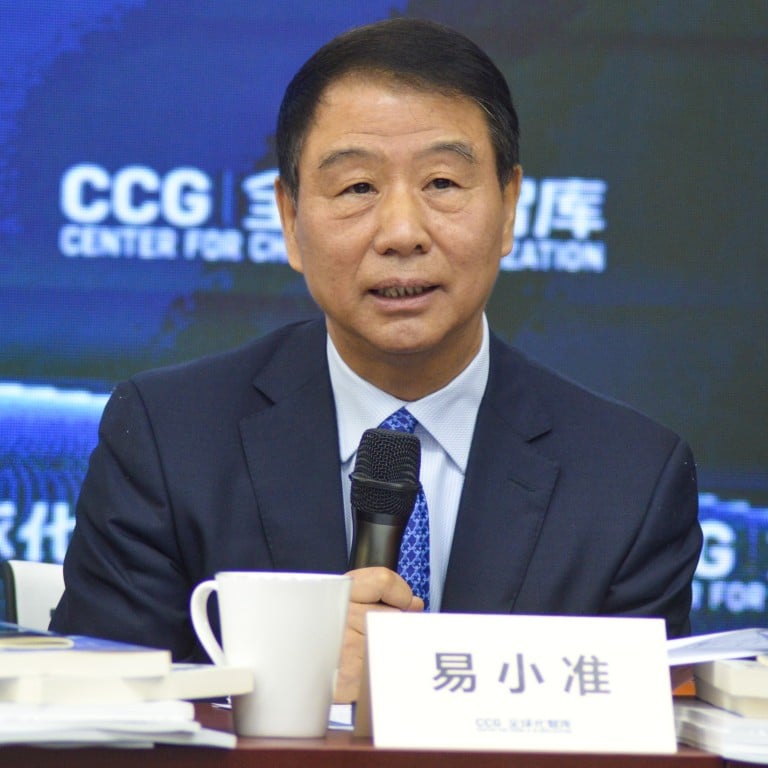
China’s WTO reform aspirations take centre stage at globalisation seminar
- The future of multilateral trade is at a crossroads, and the World Trade Organization’s new chief says changes are coming to the trade body
- Former highly placed trade authorities say China must be wary of ‘a small circle with geopolitical considerations’, while guarding against protectionism
China should seize the window of opportunity to rebuild the World Trade Organization’s authority in the global trade system while also being mindful of “a small circle” of nations pursuing unilateralism and protectionism, a senior trade adviser said on Friday.
“The direction should be trade liberalisation and facilitation,” said Yi Xiaozhun, elaborating on the Chinese principle of reforming the WTO after stepping down as deputy director general of the trade body last month.
“But we should stay alert to the intention [of some countries] to spread trade protectionism, and [we must] prevent globalisation from being driven backward,” he said at a seminar hosted by the Centre for China and Globalisation, a Beijing-based think tank.
He did not mention the United States or other countries by name, but the China-US trade war has largely paralysed the WTO’s multilateral trade endeavours since 2018.
Yi also addressed China’s priorities and concerns in the face of various reform proposals.
“Will these proposals facilitate trade or raise barriers,” he asked. “Will they strengthen the most favoured nation, the core of multilateral trade mechanisms, or introduce more discriminative factors? Will they strengthen the authority of the WTO, or weaken it by forming a small circle with geopolitical considerations?”
China has been keen on upholding trade liberalisation and defending the role of the WTO. The country is widely regarded as a major beneficiary of globalisation. Its accession to the WTO in 2001 sparked China’s economic resurgence, effectively turning it into the world’s factory and eventually its second-largest economy.
But China has also been criticised by the US and other developed nations for its subsidies and preferential treatment of domestic industries, creating an uneven playing field for foreign firms trying to do business there.
China’s joining of the WTO indeed changed global trade. As a matter of fact, [China’s involvement] is good for the whole world, including developed countries like the United States
Long Yongtu, a former vice-minister of foreign trade and the point man during China’s 15-year talks to join the WTO two decades ago, expanded on the impact of China’s role in the trade body.
“China’s joining of the WTO indeed changed global trade,” he said at Friday’s seminar. “As a matter of fact, [China’s involvement] is good for the whole world, including developed countries like the United States.”
He added that China’s involvement in the WTO offers Beijing an opportunity to open up and advance economic reforms domestically.
Yi similarly suggested that China make “constructive use” of its status and play a “more aggressive” role in WTO reform.
He also called for China to make more progress in advancing the protection of intellectual property rights, in reforming state-owned enterprises, and in opening up its services sector.
Additionally, Yi suggested the use of plurilateral negotiations, in which WTO member countries would be given the choice on whether to voluntarily agree to new rules. He said this would help advance the discussion of important issues, as the consensus-based mechanism – multilateral WTO agreements – has failed to make any breakthroughs in the past two decades.
Doubts remain within Beijing’s policy circle on whether the Geneva-based organisation can prove its effectiveness and restore its authority against the backdrop of China’s fast-deteriorating relations with major economies.
However, Hong Xiaodong, former head of the WTO Affairs Department under the Ministry of Commerce, was optimistic that the upcoming 12th WTO Ministerial Conference in November will be a touchstone for multilateral cooperation.
Fishing subsidies, Covid-19 response, grain security and the resumption of the appeals body are all high on the WTO’s work agenda.
The WTO remains at the core of China’s efforts to implement a multilateral trading system, but it also pursues regional trade deals.

